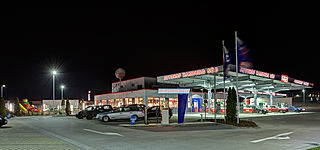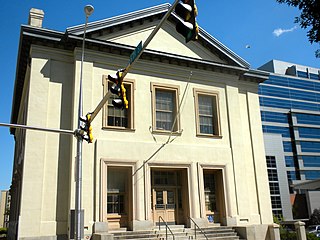
The Fourteenth Amendment to the United States Constitution was adopted on July 9, 1868, as one of the Reconstruction Amendments. Usually considered one of the most consequential amendments, it addresses citizenship rights and equal protection under the law and was proposed in response to issues related to formerly enslaved Americans following the American Civil War. The amendment was bitterly contested, particularly by the states of the defeated Confederacy, which were forced to ratify it in order to regain representation in Congress. The amendment, particularly its first section, is one of the most litigated parts of the Constitution, forming the basis for landmark Supreme Court decisions such as Brown v. Board of Education (1954) regarding racial segregation, Loving v. Virginia (1967) regarding interracial marriage, Roe v. Wade (1973) regarding abortion, Bush v. Gore (2000) regarding the 2000 presidential election, Obergefell v. Hodges (2015) regarding same-sex marriage, and Students for Fair Admissions v. Harvard (2023) regarding race-based college admissions. The amendment limits the actions of all state and local officials, and also those acting on behalf of such officials.

Wilmington is the largest city in the U.S. state of Delaware. The city was built on the site of Fort Christina, the first Swedish settlement in North America. It lies at the confluence of the Christina River and Brandywine Creek, near where the Christina flows into the Delaware River. It is the county seat of New Castle County and one of the major cities in the Delaware Valley metropolitan area. Wilmington was named by Proprietor Thomas Penn after his friend Spencer Compton, Earl of Wilmington, who was prime minister during the reign of George II of Great Britain.
Heart of Atlanta Motel, Inc. v. United States, 379 U.S. 241 (1964), was a landmark decision of the Supreme Court of the United States holding that the Commerce Clause gave the U.S. Congress power to force private businesses to abide by Title II of the Civil Rights Act of 1964, which prohibits discrimination on the basis of race, religion, or national origin in public accommodations.
United States v. Morrison, 529 U.S. 598 (2000), is a U.S. Supreme Court decision that held that parts of the Violence Against Women Act of 1994 were unconstitutional because they exceeded the powers granted to the US Congress under the Commerce Clause and the Fourteenth Amendment's Equal Protection Clause. Along with United States v. Lopez (1995), it was part of a series of Rehnquist Court cases that limited Congress's powers under the Commerce Clause.

A rest area is a public facility located next to a large thoroughfare such as a motorway, expressway, or highway, at which drivers and passengers can rest, eat, or refuel without exiting onto secondary roads. Other names include motorway service area (UK), services (UK), travel plaza, rest stop, oasis (US), service area, rest and service area (RSA), resto, service plaza, lay-by, and service centre (Canada). Facilities may include park-like areas, fuel stations, public toilets, water fountains, restaurants, and dump and fill stations for caravans / motorhomes.
E-ZPass is an electronic toll collection system used on toll roads, toll bridges, and toll tunnels in the Eastern United States, Midwestern United States, and Southern United States. The E-ZPass Interagency Group (IAG) consists of member agencies in several states, which use the same technology and allow travelers to use the same transponder on toll roads throughout the network.

Charles Layman Terry Jr. was an American lawyer and politician from Dover, in Kent County, Delaware. He was a member of the Democratic Party and served as Chief Justice of the Delaware Supreme Court as well as Governor of Delaware.
In United States constitutional law, state action is an action by a person who is acting on behalf of a governmental body, and is therefore subject to limitations imposed on government by the United States Constitution, including the First, Fifth, and Fourteenth Amendments, which prohibit the federal and state governments from violating certain rights and freedoms.

Claymont station is a station on the Northeast Corridor in Claymont, Delaware. Claymont has two high-level side platforms with a pedestrian bridge over the tracks. It is served by SEPTA Wilmington/Newark Line local service; Amtrak intercity services bypass the station via the inner tracks. The station is the northernmost stop in Delaware, continuing towards Wilmington and Newark. It has a parking garage with 464 spaces and an outdoor parking lot with 343 spaces.
Louis Lorenzo Redding was a prominent lawyer and civil rights advocate from Wilmington, Delaware. Redding, the first African American to be admitted to the Delaware bar, was part of the NAACP legal team that challenged school segregation in the Brown v. Board of Education case in front of the U.S. Supreme Court. He was 96 when he died at a hospital in Lima, Pa.
Katzenbach v. McClung, 379 U.S. 294 (1964), was a landmark decision of the U.S. Supreme Court which unanimously held that Congress acted within its power under the Commerce Clause of the United States Constitution in forbidding racial discrimination in restaurants as this was a burden to interstate commerce.

The Franklin County Government Center is a government complex of Franklin County, Ohio in the city of Columbus. The government center has included several iterations of the Franklin County Courthouse, including a building completed in 1840 and another completed in 1887. Current courthouse functions are spread out between buildings in the complex.
Robinson v. Florida, 378 U.S. 153 (1964), was a case in which the Supreme Court of the United States reversed the convictions of several white and African American persons who were refused service at a restaurant based upon a prior Court decision, holding that a Florida regulation requiring a restaurant that employed or served persons of both races to have separate lavatory rooms resulted in the state becoming entangled in racial discriminatory activity in violation of the Equal Protection Clause of the Fourteenth Amendment to the United States Constitution.

The Old Customshouse is a historic government building at 516 North King Street in Wilmington, Delaware. It was built in 1855 and added to the National Register of Historic Places in 1974.
Lebron v. National Railroad Passenger Corporation, 513 U.S. 374 (1995), is a United States Supreme Court case in which the Court held that Amtrak is a government agency and is thus subject to the First Amendment. The Court issued its decision in a 8–1 vote, with seven justices joining the majority opinion authored by Antonin Scalia. The lone dissent came from Justice Sandra Day O'Connor.
Jackson v. Metropolitan Edison Co., 419 U.S. 345 (1974), is an administrative law case of the Supreme Court of the United States holding that extensive state regulation of a public utility does not transform its acts into state action that is reviewable by a federal court under the Fourteenth Amendment to the United States Constitution.
The following is a timeline of the history of the city of Wilmington, Delaware, USA.
Arlington County Board v. Richards, 434 U.S. 5 (1977), is a United States Supreme Court decision on the application of the Equal Protection Clause of the Fourteenth Amendment to the Constitution to municipal parking restrictions. In a unanimous per curiam opinion, the Court held that a residential zoned parking system requiring permits for daytime parking in the Aurora Highlands neighborhood of Arlington County, Virginia, with those permits limited to residents, their guests and those who came to their homes for business purposes had a rational basis and was thus constitutional. Its decision overturned the Virginia Supreme Court.
Peterson v. City of Greenville, 373 U.S., was a United States Supreme Court case that maintained the illegality of race-based segregation in public places. Ten African American student protesters were arrested and convicted in Greenville, South Carolina for attempting to purchase food at an S.H. Kress lunch counter. After the African American students arrived at the restaurant and sat at the lunch counter, the manager abruptly closed the store and instructed the protesters to leave. The manager and police argued that the protesters violated a state trespassing ordinance and were not arrested because of their race. While the Supreme Court of South Carolina maintained the students' guilt, the United States Supreme Court reversed the decision, citing that a "violation of the Fourteenth Amendment cannot be saved by attempting to separate the mental urges of the discriminators."








